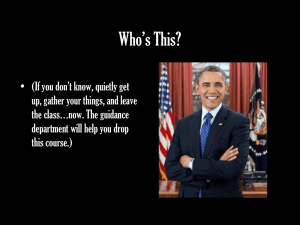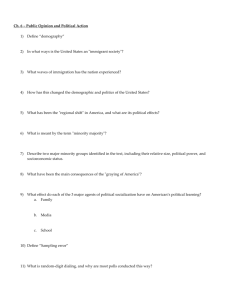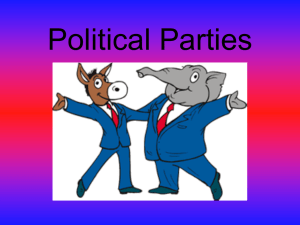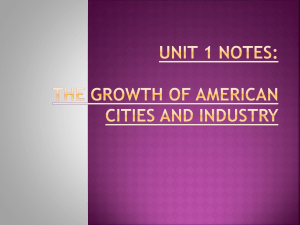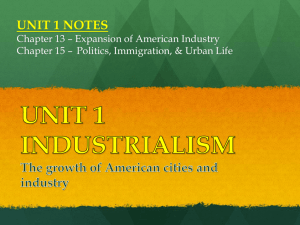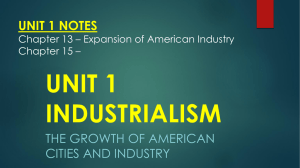presidentsreview - Catawba County Schools
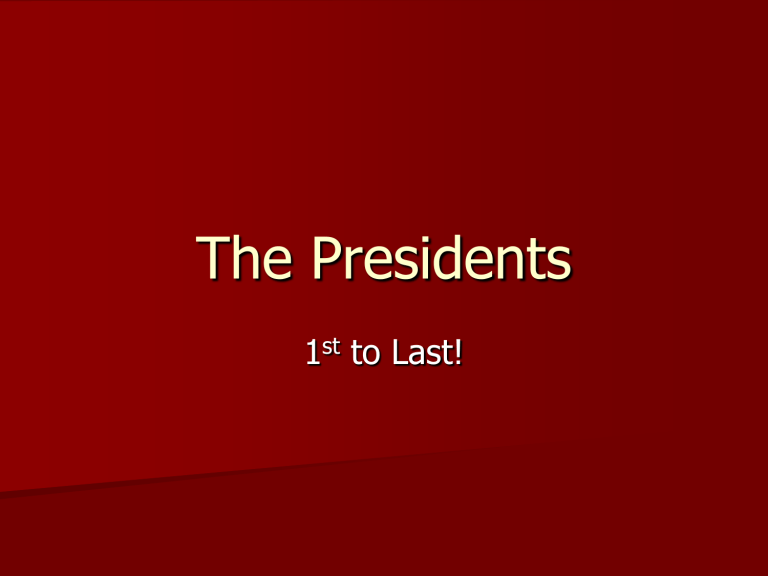
The Presidents
1
st
to Last!
Early Republic (1789-1829)
George Washington (1789-1797)
Federalist
Establishes a national bank: takes on debts of the states
Whiskey Rebellion-shows willingness to enforce the law with force
Bill of Rights ratified
Jay’s Treaty–impressment
No entangling alliances / nonalignment / non-alliance / warns against political parties
Pinkney’s Treaty / right of deposit in New Orleans / free navigation of the Mississippi
River
John Adams (1797-1801)
FEDERALIST
XYZ Affair-leads us close to war with
France (quasi-war)
VA and KY Resolutions-
NULLIFICATION
The Alien and Sedition actsstipulating requirements for naturalized citizenship, demanded residence in the United States for period of fourteen years and a declaration of intention for five years.
– granting President Adams the power to deport any alien he deemed potentially dangerous to the country's safety.
– No malicious or false writings about government
Thomas Jefferson (1801-1809)
DEMOCRATIC
REPUBLICANS
Marbury v Madison – established judicial review
(John Marshall)
Louisiana Purchase- more than doubled the size of the United States; Lewis and Clark
STRICT Construction
Embargo Act of 1807- no trade
Leopard v Chesapeake
James Madison (1809-1817)
D-R
“Mr. Madison’s War”- the War of 1812; Treaty of Ghent
Non-Intercourse Act (1809)- will trade with anyone but France/ Britain
Macon’s Bill #2 – Whichever nation would respect American neutrality we would resume trade
Hartford Convention- Federalists meet to discuss secession from the Union
Northwest Indian War – Battle of Fallen Timbers
– US Army routed the Indians forced the Treaty of Greenville (Indians gave the US government parts of OH, IL, IN,
Tecumseh – never signed treaty fought with the
British in War of 1812 with his brother “The
Prophet”
Hartford Convention – Death of Federalist Party
James Monroe (1817-1825)
D-R
“Era of Good Feelings” – non partisan politics – strength of the federal gov’t over the states
American System (John C. Calhoun and Henry Clay) – New national bank charter, high protective tariff, internal improvements (roads, bridges, etc.)
Adams-Onis Treaty – Florida
Gibbons v. Ogden – federal gov’t control over interstate commerce
McCulloch v. Maryland – states can’t tax the federal gov’t – National Bank
Monroe Doctrine – European powers stay out of the Western Hemisphere
Missouri Compromise (Comp of 1820
/ 36*30’ Compromise) – Missouri –
Slave State / Maine – Free State – slavery not allowed N of 36*30’ line in LA Purchase
John Quincy Adams (1825-1829)
D-R
Election of 1824 / Adams vs.
Jackson – mudslinging / Jackson
44% of vote – no majority –
Election went to House of Reps
“Corrupt Bargain” – Adams name
Speaker of House Henry Clay as his
Sec. of State in exchange for Clay’s influence in House / Adams became
President
Erie Canal
Tariff of Abominations (John
Calhoun)
– South Carolina Exposition and
Protest ; state’s rights and nullification
Jacksonian Democracy (1829-1853)
Andrew Jackson (1829-1837)
DEMOCRAT
Representative of “common man”
Jacksonian Democracy – Spoils System
/ national nominating conventions
Indian Removal Policy – Worcester v.
Georgia – Supreme Court (Marshall) ruled in favor of the Indians
Trail of Tears – Jackson refused to enforce the decision / sent Indian to OK
Nullification Crisis with SC over tariff
Force Acts – Jackson can use the military to stop nullification
Compromise Tariff 1832– gradual reduction of tariff rates
Opposed to the Bank of the U.S.
Texas applies for statehood after defeating Mexico – denied because of issue of slavery
Nat Turner slave rebellion
Martin Van Buren (1837-1841)
DEMOCRAT
Panic of 1837 – Economic depression caused by Jackson’s bank policies
Transcendentalism- movement for selfreliance / getting back to nature / nonviolence (Thoreau and Emerson)
Dorothea Dix – prison reform for mentally handicapped
Horace Mann – Mass. State School
Superintendent – compulsory education laws
“Hudson River School” – Art movement aimed at depicting American landscapes
Communal living (protests) – Brook
Farm, New Harmony, and Oneida
William Henry Harrison (1841)
WHIG
32 days in office
“Tippecanoe and
Tyler Too!”
Log Cabin Election – used Jacksonian tactic of appealing to the
“common man”
John Tyler (1841-1845)
WHIG, sided Democrat
Brought Texas into the
U.S. with a joint resolution
William Lloyd Garrison –
The Liberator – immediate abolition of slavery
The Grimke sisters –
Angelina and Sarah – abolitionists
Frederick Douglass – The
North Star
James K. Polk (1845-1849)
DEMOCRAT
Manifest Destiny – American theory of
God-given right to expand all the way to the Pacific Ocean
“54* 40’ or Fight” – US was willing to go to war against Britain for the Oregon
Territory
Desired to annex California
Treaty of Guadalupe-Hidalgo - Got the US involved in the Mexican-American War / won / got California, TX, AZ, NM, NV, and parts of other states in the West
Seneca Falls Convention – Women’s Rights
– Lucretia Mott and Elizabeth Cady
Stanton
Zachary Taylor (1849-1850)
WHIG
Compromise of 1850 – strong Fugitive Slave Act /
California admitted to the
Union / DC banned the slave trade
Wilmot Proviso – reopened the issue of slavery – called for all of the Mexican Cession to be free
Millard Fillmore (1850-1853)
WHIG
Uncle Tom’s Cabin
by
Harriet Beecher
Stowe “The little bitty woman who started the great big war.” A.
Lincoln
Sectional Conflict (1853-1881)
Franklin Pierce (1853-1857)
DEMOCRAT
Gadsden Purchase – completed mainland U.S. to complete a RR through
Southern AZ and NM
Matthew Perry to Japan
Kansas-Nebraska Act/
“Bleeding Kansas”
Know-Nothing Party
Sumner-Brooks Incident
James Buchanan (1857-1861)
DEMOCRAT
Dred Scott v Sandford
Lecompton Constitution- tries to bring Kansas in as a slave state
Lincoln-Douglas Debates
Comstock Lode
John Brown and Harper’s Ferry
Crittendon Compromise- Missouri
Compromise lines extended nationwide
Abraham Lincoln (1861-1865)
REPUBLICAN
Election causes secession of SC
Preservation of the Union
First shots at Ft. Sumter
Morrill Land Grant – gave land to colleges
Emancipation Proclamation – didn’t free any slaves (except in the
Confederacy)
13 th Amendment
10% Plan of Reconstruction – 10% of state’s voters to sign loyalty oath for readmission to Union – amnesty to former Confederates
Andrew Johnson (1865-1869)
REPUBLICAN
Radical Republicans v Johnson
(Thaddeus Stevens)
Seward’s Folly – purchase of Alaska for $7 million
Impeachment (Tenure of Office Act
Violation) – tried to fire Sec. of War
Edwin Stanton
14 th Amendment
Civil Rights Act of 1866- to counterattack the black codes that had been passed by Southern governments
Homestead Act- gave 160 acres of western lands to anyone for a small filing fee and improvement to land
Freedmen’s Bureau – established for blacks and refugees – greatest accomplishment was in education – no land was ever given to blacks
Ulysses S. Grant (1869-1877)
REPUBLICAN
Transcontinental Railroad completed (Promontory
Point)
15 th Amendment
Credit Mobilier Scandal
Panic of 1873
WCTU founded
Whiskey Ring Scandal
Rutherford B. Hayes (1877-1881)
REPUBLICAN
Compromise of 1877 – won election after election fraud is investigated – Union removes troops from South
Great Railroad Strike
Knights of Labor established
(Terrence Powderly) – least discriminative labor union – difficult to organize / disbanded after Haymarket Square Riot
Used court injunctions to stop strikes
James A. Garfield (1881)
REPUBLICAN
Assassinated
The Grange established by
Oliver H. Kelley – foundation of
Populism in America formed to combat against railroad monopolies and banks
Robber barrons – Rockefeller
(Oil), Carnegie (Steel), Morgan
(Finance/ Steel), Vanderbilt
(Railroads), Stanford
(Railroads), Swift
(Meatpacking)
Gilded Age (1881-1897)
Chester Arthur (1881-1885)
REPUBLICAN
Chinese Exclusion Act – until 1940’s
Pendleton Act – required an exam to be taken in order to work for the federal government – abolishes the “spoils system”
Grover Cleveland (1885-1889)
DEMOCRAT
Samuel Gompers-AFL – discriminative labor union fought for the 8 hour workday
Created the ICC – Interstate
Commerce Commission – 1 st government agency to regulate business
Dawes Act – federal government offers 160 acres of land to Indian heads of household in order to
ASSIMILATE Indians into
American culture
Haymarket Square Riot –
German anarchists striking for
8 hour workday killed Chicago policemen – death of Knights of Labor
Benjamin Harrison (1889-1893)
REPUBLICAN
Lost popular vote, won election
1890-Sherman Anti-
Trust act
Creates courts of appeal
Thomas Nast – cartoons that lampooned William
“Boss” Tweed
Grover Cleveland (1893-1897)
DEMOCRAT
William Jennings Bryan- Cross of Gold Speech—gold and silver standard –
Bland – Allison Act
Pullman Strike (Eugene Debs)
– leader of Socialism
Plessy v. Ferguson – separate but equal facilities is legalized
Booker T. Washington – believed in jobs for blacks for equality (Atlanta Compromise)
W.E.B. DuBois – believed education and suffrage would achieve equality for blacks
Progressive Era (1897-1921)
William McKinley (1897-1901)
REPUBLICAN
Annexation of Hawaii
Maine
“yellow journalism” – William
Randolph Hearst and Joseph
Pulitzer
Jingoism – excitement about going to war with Spain
Boxer Rebellion
Teller Amendment – Cuba became a protectorate of the US -
Platt Amendment – gave US the right to intervene with military in
Cuban affairs – gave the US naval base – Guantanamo Bay
Spanish American War
– Phillipines, Cuba, Guam Puerto Rico
Open – Door Policy – open trade with China
Theodore Roosevelt (1901-1909)
REPUBLICAN
One of the Rough Riders in
Spanish-American War
IMPERIALISM- Panama Canal,
Great White Fleet – to establish more markets overseas
Roosevelt Corollary (to the
Monroe Doctrine)
Progressive- helped fix problems exposed by muckrakers and “trust bust”
Ida Tarbell / Upton Sinclair /
Lincoln Steffens / Jacob Riis – muckrakers
Triangle Shirtwaist Company
Fire – safety code regulations
Jane Addams and Hull House – social work (settlement house)
Pancho Villa – raids into U.S. territories – never stopped
William Howard Taft (1909-1913)
REPUBLICAN
“Dollar diplomacy” – aid to Latin American countries to protect our investments down there
Trust buster- one of the presidents to take down big business
Marcus Garvey – blacks should form a SEPARATE government in Africa –
Liberia
Woodrow Wilson (1913-1921)
DEMOCRAT
Won because Taft and TR split
Republican vote
Kept American neutral in WWI until 1917
Lusitania and the Sussex ; unrestricted sub warfare
Fourteen Points/ League of
Nations- plan for peace /
Henry Cabot Lodge was opponent
Treaty of Versailles- punished
Germany and helped to lead to
WWII; Congress rejects because of “entangling alliances”
Schenk v. U.S
. – “clear and present” danger / can’t undermine the US gov’t in time of war
Depression and World Conflict
(1921-1961)
Warren G. Harding (1921-1923)
REPUBLICAN
“Return to Normalcy”
Teapot Dome Scandal- leasing of government land illegally to the benefit of his friends;
Albert Fall 1 st Cabinet member to prison
“Ohio Gang”-surrounded himself with his friends from home in Cabinet
T.S. Eliot and Eugene O’Neill –
“Lost Generation” writers – disillusioned by WWI
Kellogg – Briand Pact – US,
France then multilateral agreement AGAINST WAR
The Jazz Singer first talking motion picture
Calvin Coolidge (1923-1929)
REPUBLICAN
“Keep Cool with Coolidge”
Wanted to reform the government, get rid of the spoils system
John T. Scopes Trial – rural vs. urban values (teaching evolution in South)
Sacco and Vanzetti Trial –
NATIVISM / executed for murder
Charles Lindbergh – flew across the Atlantic in “Spirit of
St. Louis”
Herbert Hoover (1929-1933)
REPUBLICAN
“Hoovervilles”- blamed for the Depression
Speculation- main cause of depression
Bonus Army- wanted
$1,000 bonuses early, physically removed by military
“laissez-faire”
Black Tuesday-
10/29/1929
Franklin D. Roosevelt (1933-1945)
DEMOCRAT
New Deal Programs- out of the
Depression
CCC, TVA, WPA, Social
Security
Neutrality Act of 1936
Pearl Harbor/ WWII
Polio disease
4 term president
Fireside chats
First woman in cabinet-
Frances Perkins
US joins the United Nations –
180 member peace keeping nations – Security Council is responsible for keeping the peace
Harry S Truman (1945-1953)
DEMOCRAT
Made the decision to drop the atomic bomb
Desegregation of the military
CONTAINMENT/ Communismmust contain the spread
Truman Doctrine—Korean War
(1950-1953)
Start of McCarthyism – “Red
Scare” – Rosenberg Trial
Potsdam Conference – divided
Germany between Allies and
Soviet Union / demilitarized
Germany
Bill Levitt / Levittown, NY / subdivision –
GI Bill of Rights – low interest home mortgages and free college education for GI’s
Dwight D. Eisenhower (1953-1961)
REPUBLICAN
First televised presidential ads
“Ike For President”
Domino Theory- if Vietnam falls to Communism, SE Asia will follow
Federal Highway Actexpansion of the interstate system
Eisenhower Doctrine-
BRINKSMANSHIP - "prepared to use armed force...[to counter] aggression from any country controlled by international communism."
Farewell Address – warned the people of the military – industrial complex / not favorable to the public
Cold War (1961-1989)
John F. Kennedy (1961-1963)
DEMOCRAT
Cold War- had to deal with the
Soviets with the Cuban Missile
Crisis, Bay of Pigs, Race to Space,
Nuclear Arms Race.
Alliance for Progress – 20 billion dollar to Latin America
Peace Corps
National Television Debate vs.
Nixon
Women’s Liberation – Betty
Friedan – The Feminine Mystiqueencouraged middle class women to seek professional careers
N.O.W. – National Organization of
Women – Gloria Steinem
Birth Control Pill – introduced by
Margaret Sanger in 1920’s
Lyndon B. Johnson (1963-1969)
DEMOCRAT
Lyndon Baines Johnson- Great
Society- Medicare – elderly,
Medicaid - poor, HUD-government housing projects based on income,
Head Start- helping poor children in education, VISTA- helping the poor here at home.
VIETNAM – ESCALATION – Gulf of
Tonkin Resolution – gave LBJ power to use military without
Congressional declaration of war
Tet Offensive
My Lai Massacre
Civil Rights Act of 1964 – est.
Equal Employment Opportunity
Commission
Voting Rights Act of 1965
Richard Nixon (1969-1974)
REPUBLICAN
New Federalism- smaller government
SALT I- limit nuclear arms with the
Soviets
Détente- relaxed relations with the
Soviets
China visit / Moscow visit
Watergate- burglary to the Democratic headquarters / story broken by Bob
Woodward and Carl Bernstein
(Washington Post)
CREEP – Committee to Re-Elect the
President
EPA- environment
Vietnamization – making South
Vietnam responsible for the war
26 th Amendment – 18 year old vote
Rachel Carson – Silent Spring
Congress bans DDT pesticide
–
Roe v. Wade – legalized abortion
Swann v. Meckenberg – legalized busing
Gerald Ford (1974-1977)
REPUBLICAN
Pardoned Nixon
Fight inflation – wanted to control widespread rise of prices in the economy
Only President to never have been elected
Jimmy Carter (1977-1981)
DEMOCRAT
Iran Hostages- 52 Americans held
444 days in Iran.
Department of Energy established emission policies and inspections for auto vehicles
Oil Embargo – prices of oil rose drastically under Carter.
Dept of Education
Camp David Peace Accords /
Israel (Menachim Begin) and
Egypt (Anwar Sadat)
Malaise Speech – encouraged
Americans to have faith and pull together
Human rights – disagreed with
Apartheid in South Africa
Bakke v. California – quota systems are unconstitutional
Three Mile Island -
Ronald Reagan (1981-1989)
REPUBLICAN
Reaganomics- Trickle Down
Theory- tax cuts for the wealthy result in more investments jobs for poor
Star Wars- SDI (Strategic
Defense Initiative) satellites to fire upon incoming enemy missiles
Iran Contra Scandal- gave weapons to the rebels for the release of our hostages in Iran
– 444 days.
New Right Coalition / Moral
Majority – against abortion, gay rights, women’s rights
Texas v. Johnson – legalized flag burning
Globalization (1989-present)
George Bush (1989-1993)
REPUBLICAN
Persian Gulf War – 1990-
United States ousted Iraq out of Kuwait…defeated
Saddam Hussein.
Fall of the Berlin Wall and the collapse of the Soviet
Union.
“Read my lips. No new taxes.”
Dave Kovic (1993)
Takes over when president suffers a stroke
Lots of corruption, pushes for help for the homeless
Bill Clinton (1993-2001)
Supported NAFTA- North
American Free Trade
Agreement- open trade among Canada, U.S., and
Mexico.
Hillary Clinton’s led
Health Care Plan fails.
Bosnia- he bombed the
Serbs in Bosnia because they were ethnically cleansing Muslims –
Genocide.
James Dale (1996)
Wants to be friends with the aliens but is ultimately destroyed himself
With the help of football legend Jim Brown, earth was saved
Thomas Whitmore (1996)
Intergalactic attack
David Palmer (2000-2002)
Terrorism marked his turbulent time as president
Was nearly the victim of a deadly chemical attack himself
1
st
African American president
George W. Bush (2001-2009)
REPUBLICAN
2001- September 11-
TERRORISTS attack the World
Trade Center which led to the war on terror.
Invasion of Afghanistan – against terrorists organizations
Iraqi War – Saddam Hussein
No Child Left Behind- close the gap between rich and poor students performance and improve low performing schools.
War on Terror – Patriot Act – gives the federal government power to invade personal privacy in case of terrorism –
ACLU disagrees
Mays Gilliam (2002)
First black president of the
United States
Elected with very little political experience
Barack Obama
DEMOCRAT
First African American to hold office.
Wants to close
Guantanamo Bay
Detention Camp for terrorists.
Reduce imported oil
Universal Health Care supporter.
